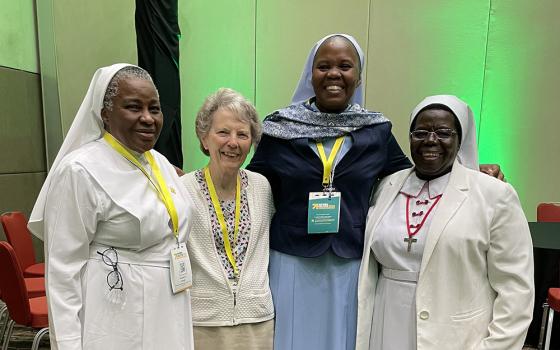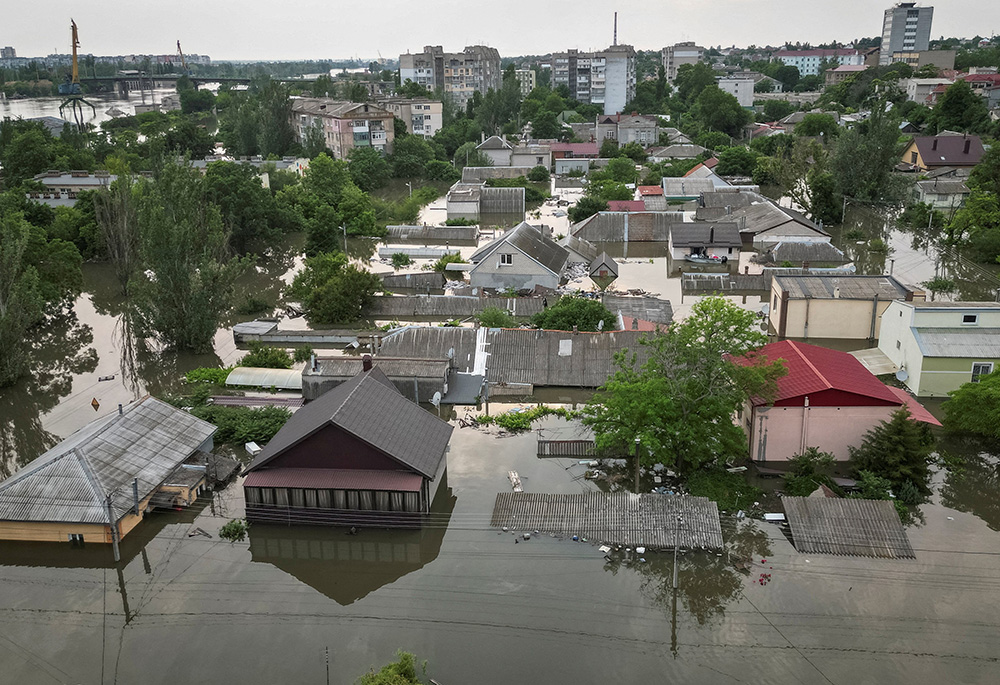
A view shows a flooded area in Kherson June 7 after the Nova Kakhovka dam breached, amid Russia's attack on Ukraine. (OSV News/Reuters/Vladyslav Smilianets)
The recent flooding caused by a collapsed dam in southeastern Ukraine has demoralized residents who live close to the front lines of the Russo-Ukrainian war, says a Ukrainian sister who has been helping coordinate humanitarian efforts during the last 16 months and calls the situation "desperate."
"The many villages close to Kherson are really suffering," Sr. Lucia Murashko, a member of the Sisters of the Order of St. Basil the Great, said of the situation in areas affected by the June 6 collapse of the Nova Kakhovka dam on the Dnipro River.
But Murashko, who lives and ministers in the city of Zaporizhzhia, about 100 miles upstream from the dam, added that the flooding has added additional pressures for civilians in areas close to the front and that people are becoming worn down by the war's toll.
She said a year ago, it was easy to raise money for humanitarian efforts within Ukraine. But now donor fatigue is setting in.
"It's not easy," Murashko said in a June 14 telephone interview with Global Sisters Report. "Physically, financially and spiritually, we are tired," Murashko said of the Ukrainian populace.
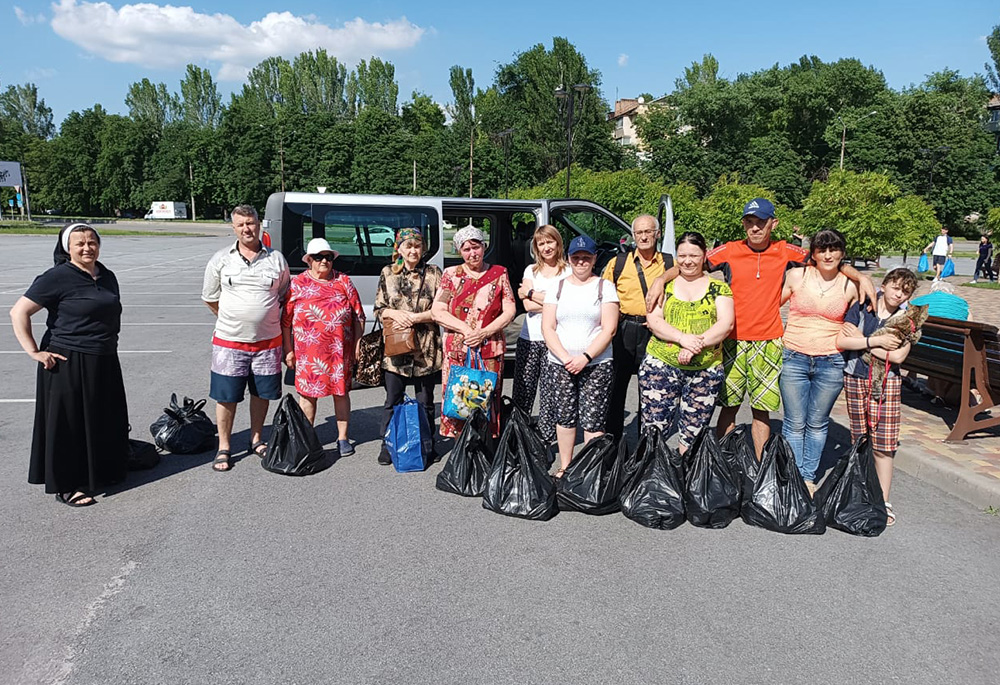
Sr. Lucia Murashko, a member of the Sisters of the Order of St. Basil the Great, is pictured with volunteers in the city of Zaporizhzhia, responding to the floods caused by the June 6 collapse of the Nova Kakhovka dam on Ukraine's Dnipro River. (Courtesy of Sr. Lucia Murashko)
While Murashko said Ukrainians still believe the war against Russian forces can be won, there is no doubt "that it's hard to live in this pain" and that the "cost of ultimate victory and peace will be high."
"It's so sad," she said, noting that a soldier she knows recently wrote to her and said in the current Ukrainian counteroffensive against Russian forces, 55 soldiers in his unit had died and only 15 returned after gaining only 1 kilometer — less than a mile — of territory.
"It's a very high price," Murashko said, noting that hospitals near the front "are full of wounded soldiers."
She thinks the reality of the war "is harder" and graver than depicted on television news reports.
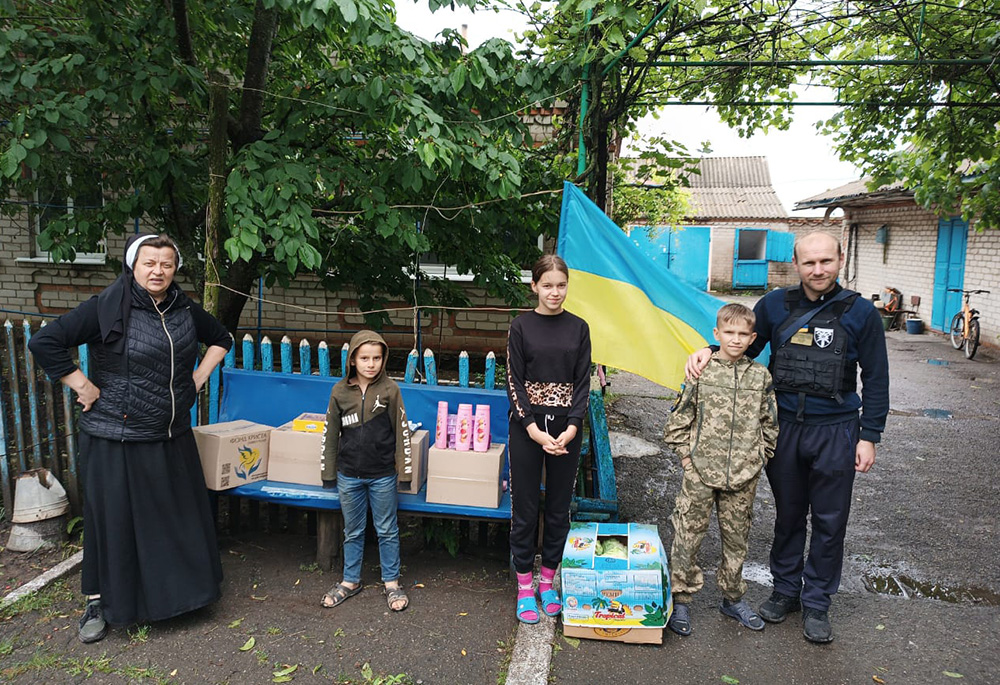
Sr. Lucia Murashko, left, is pictured with a family in the city of Zaporizhzhia, helping with efforts in responding to the floods caused by the June 6 collapse of the Nova Kakhovka dam on Ukraine's Dnipro River. (Courtesy of Sr. Lucia Murashko)
Of the dam incident, the BBC said in a June 11 report that both Ukraine and Russia have exchanged accusations about which side is responsible for the dam's collapse.
The BBC said it had not "verified either claim, although it appears likely that Russian forces, who controlled the dam, decided to blow it up in order to complicate Ukraine's ongoing counteroffensive."
At the same time, the Washington-based Institute for the Study of War noted June 12 that the "flooding has destroyed many Russian first line field fortifications that the Russian military intended to use to defend against Ukrainian attacks."
Murashko told GSR that Ukrainians are convinced that Russia is responsible for the dam's destruction because Ukrainians would not deliberately "want to destroy our own land, our own cities and industries."
She said while Zaporizhzhia has not suffered from the flooding, "we can help."
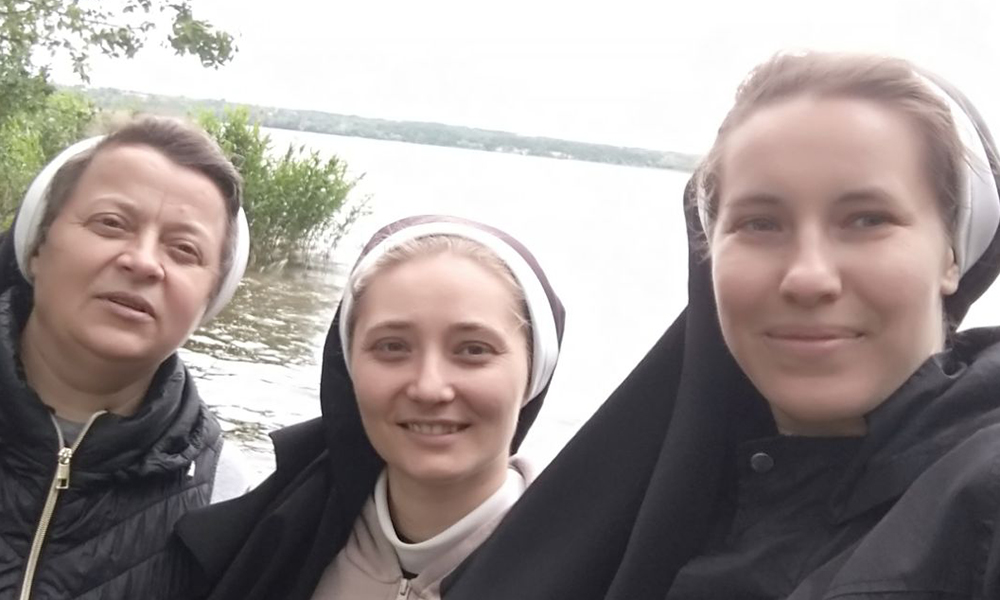
Sr. Lucia Murashko, left, is pictured with the two other sisters of the St. Basil the Great convent in the city of Zaporizhzhia, in southeastern Ukraine. The sisters are Sr. Meletia Hajniuk, center, and Sr. Elizabeth Varnitska. (Courtesy of Sr. Lucia Murashko)
There is much to do: Thousands have fled flood-affected areas, and at least five people have died. There are also mounting concerns about the flood's short-term and long-term environmental impact.
Murashko, 48, is the superior of a three-sister convent in Zaporizhzhia, a city not far from the front lines and which has been shelled by Russian forces throughout Russia's 16-month full-scale invasion of Ukraine.
To assist survivors of the flooding, the convent has provided donated food, water, clothes, diapers, generators, and health products to survivors — shepherded by volunteers who have worked with the sisters and transported the items to flood-affected areas southwest of Zaporizhzhia.
Advertisement
Murashko noted that the sister-assisted efforts cannot help those on the Russian-occupied side of the flooded areas — only the Dnipro River separates the Russian and Ukrainian forces. "It's a desperate situation and we're helpless to assist them," she said.
On the overall situation of morale, Murashko said Ukrainians remain angry about the war, "but we can't do anything with our anger. The war provokes anger in our hearts and that's very difficult."
At the same time, Murashko takes heart in the efforts of volunteers who are transporting the aid to flood-affected areas, and for the financial and material support from sisters in other parts of Ukraine and in neighboring European countries, particularly Romania, as well as Italy and France.
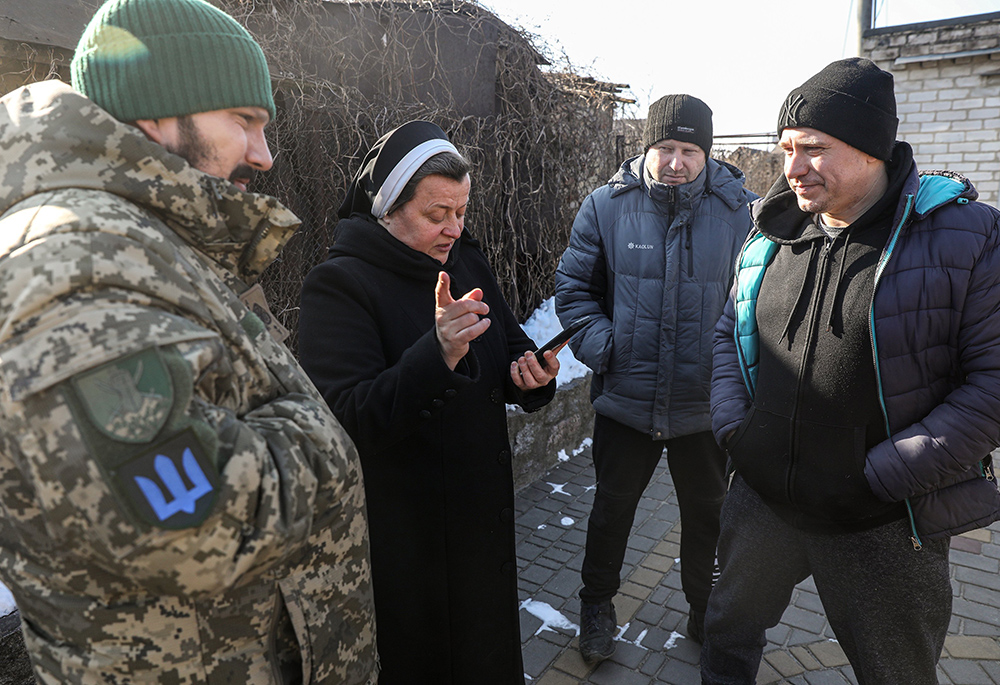
Basilian Sr. Lucia Murashko talks with volunteers Denys Kuprikov, left, and Ivan Smyglia, far right, in Zaporizhzhia in southeast Ukraine Feb. 7 about where they will distribute humanitarian aid along the front in Russia's war against Ukraine. (OSV News/CNEWA/Konstantin Chernichkin)
Next week, Murashko will meet with a group of American donors.
In addition to financial support, Murashko said she and other sisters urge continued prayers for peace and for the sisters' work.
"Any kind of support, including prayers, are important," Murashko said. "Any support, please do it. We want to be good people, good Christians. Help us in any way you can. It's very important. It gives us the strength to continue."
For the moment, Murashko hopes to remain steadfast and continue her ministry in Zaporizhzhia.
"I will not give up," she said.




